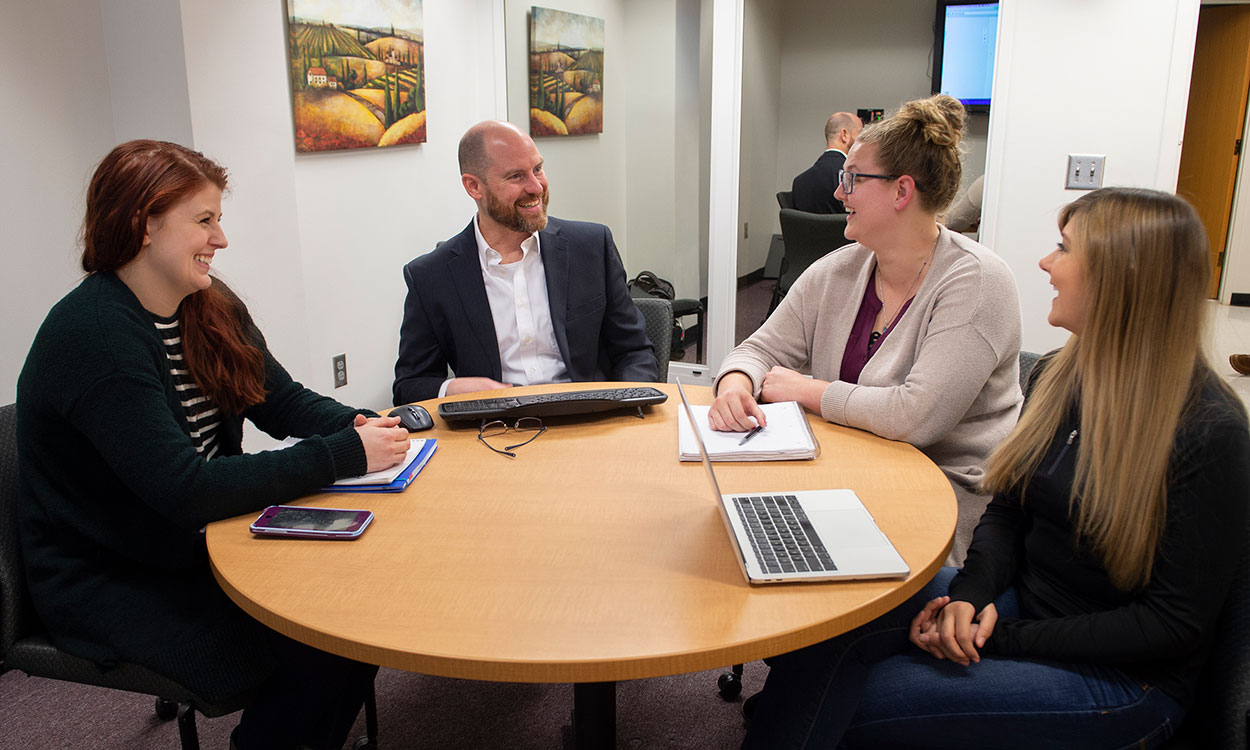New psychology doctorate approved by SACSCOC; school psychology program earns praise

WCU alumnus Jonathan M. Campbell, director of the university's new doctoral program in psychology, meets with psychology graduate students (from left) Heather Styles-Turbyfill, Kelsey Freeman and Samantha Klaver.
Faculty members in Western Carolina University’s Department of Psychology are looking toward enrolling the first students in the university’s new doctoral-level program in psychology following the program’s approval for accreditation by the Southern Association of Colleges and Schools Commission on Colleges.
The first cohort of students in the Doctor of Psychology in Health Services Psychology Program is expected to begin course work next fall. The student’s commitment in the practitioner-focused program will include two years on the Cullowhee campus engaged in full-time course work, followed by a one-year clinical internship of 2,000 hours. A thesis and dissertation also are among the degree requirements.
The program is designed to help address the need for more mental health service providers, especially in the western region of North Carolina. Enrollment is expected to eventually reach 24 students, and candidates for the doctoral degree must already have earned a master’s degree in psychology or a closely related field.
WCU currently offers a master’s degree in clinical psychology and a specialist degree in school psychology. Those two degrees will satisfy prerequisite requirements for the new doctoral program.
Jonathan M. Campbell, a 1995 alumnus of WCU’s psychology program, joined the university’s faculty last July to oversee the new doctorate. A native of Chapel Hill, he formerly directed doctoral programs in psychology at the University of Georgia and the University of Kentucky.
Alvin Malesky, professor and head of WCU’s Psychology Department, said the new doctorate “has been a decade-plus in the making and would never have happened without the hard work of multiple individuals.” That group, he said, includes Interim Chancellor Alison Morrison-Shetlar, Acting Provost Carol Burton, current and past deans of the Graduate School and the College of Education and Allied Professions, faculty and staff throughout the Psychology Department and the department’s task force that worked on establishing the new degree.
Malesky also thanked Campbell for his efforts so far and his work that is still to come, and he singled out psychology professor David McCord. “Many people have been involved in making this happen, but David has been a consistent stalwart despite multiple setbacks, challenges and changes in the process,” he said.
Approved by the University of North Carolina Board of Governors in January 2018, the doctorate in psychology is WCU’s fourth doctoral-level program. The university already offers doctorates in educational leadership, physical therapy and nursing practice.
While university officials prepare for the new doctoral program to get underway, the specialist degree program in school psychology will continue in its current form because of its importance in preparing professionals to work in school systems across Western North Carolina and the state, Malesky said.
The school psychology program recently received accolades and full program approval following a formal review conducted by the National Association of School Psychologists as a specialized professional association of the Council for Accreditation of Education Preparation. In a report summarizing the review, NASP pointed out the program’s “numerous noteworthy strengths,” which include its faculty, established procedures for assessing student progress and providing them with feedback, and a clinic-based practicum that provides close supervision and skill development opportunities.
The program’s graduates are eligible for licensure at the state level and national certification as school psychologists after completing degree requirements and passing an exam. The program is coordinated by Lori Unruh, who directs graduate studies for the department. “We are very proud of the quality of training the graduate students in this program receive as evidenced by consistently positive feedback from internship supervisors and school employers working with our students and graduates,” Unruh said.
For more information about the new doctorate in psychology, contact Campbell at jmcampbell@wcu.edu. Information about the specialist degree in school psychology is available online or by contacting Unruh at lunruh@wcu.edu.

